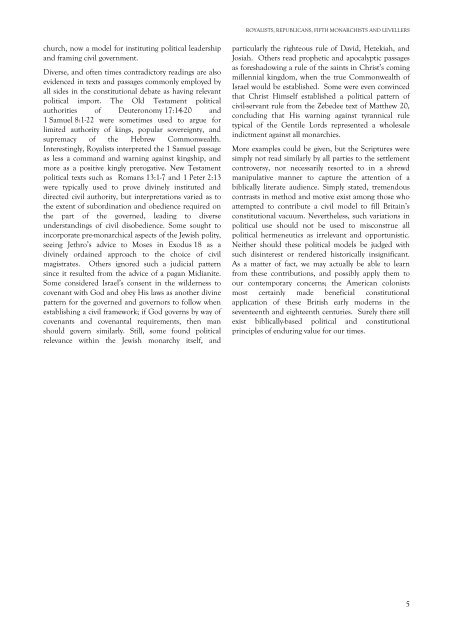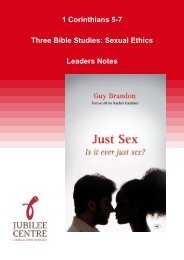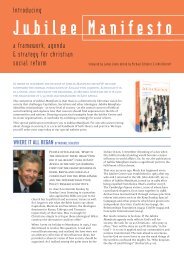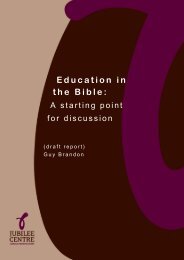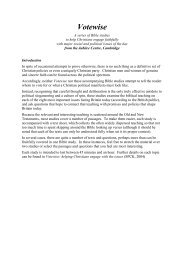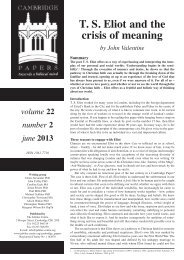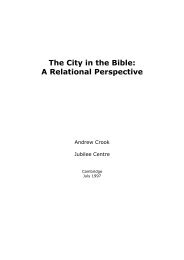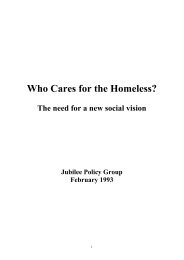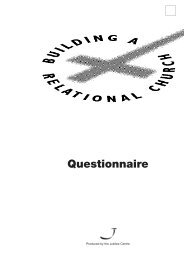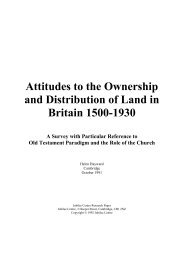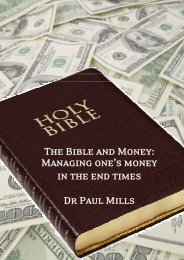Report Template - Jubilee Centre
Report Template - Jubilee Centre
Report Template - Jubilee Centre
You also want an ePaper? Increase the reach of your titles
YUMPU automatically turns print PDFs into web optimized ePapers that Google loves.
ROYALISTS, REPUBLICANS, FIFTH MONARCHISTS AND LEVELLERS<br />
church, now a model for instituting political leadership<br />
and framing civil government.<br />
Diverse, and often times contradictory readings are also<br />
evidenced in texts and passages commonly employed by<br />
all sides in the constitutional debate as having relevant<br />
political import. The Old Testament political<br />
authorities of Deuteronomy 17:14-20 and<br />
1 Samuel 8:1-22 were sometimes used to argue for<br />
limited authority of kings, popular sovereignty, and<br />
supremacy of the Hebrew Commonwealth.<br />
Interestingly, Royalists interpreted the 1 Samuel passage<br />
as less a command and warning against kingship, and<br />
more as a positive kingly prerogative. New Testament<br />
political texts such as Romans 13:1-7 and 1 Peter 2:13<br />
were typically used to prove divinely instituted and<br />
directed civil authority, but interpretations varied as to<br />
the extent of subordination and obedience required on<br />
the part of the governed, leading to diverse<br />
understandings of civil disobedience. Some sought to<br />
incorporate pre-monarchical aspects of the Jewish polity,<br />
seeing Jethro’s advice to Moses in Exodus 18 as a<br />
divinely ordained approach to the choice of civil<br />
magistrates. Others ignored such a judicial pattern<br />
since it resulted from the advice of a pagan Midianite.<br />
Some considered Israel’s consent in the wilderness to<br />
covenant with God and obey His laws as another divine<br />
pattern for the governed and governors to follow when<br />
establishing a civil framework; if God governs by way of<br />
covenants and covenantal requirements, then man<br />
should govern similarly. Still, some found political<br />
relevance within the Jewish monarchy itself, and<br />
particularly the righteous rule of David, Hezekiah, and<br />
Josiah. Others read prophetic and apocalyptic passages<br />
as foreshadowing a rule of the saints in Christ’s coming<br />
millennial kingdom, when the true Commonwealth of<br />
Israel would be established. Some were even convinced<br />
that Christ Himself established a political pattern of<br />
civil-servant rule from the Zebedee text of Matthew 20,<br />
concluding that His warning against tyrannical rule<br />
typical of the Gentile Lords represented a wholesale<br />
indictment against all monarchies.<br />
More examples could be given, but the Scriptures were<br />
simply not read similarly by all parties to the settlement<br />
controversy, nor necessarily resorted to in a shrewd<br />
manipulative manner to capture the attention of a<br />
biblically literate audience. Simply stated, tremendous<br />
contrasts in method and motive exist among those who<br />
attempted to contribute a civil model to fill Britain’s<br />
constitutional vacuum. Nevertheless, such variations in<br />
political use should not be used to misconstrue all<br />
political hermeneutics as irrelevant and opportunistic.<br />
Neither should these political models be judged with<br />
such disinterest or rendered historically insignificant.<br />
As a matter of fact, we may actually be able to learn<br />
from these contributions, and possibly apply them to<br />
our contemporary concerns; the American colonists<br />
most certainly made beneficial constitutional<br />
application of these British early moderns in the<br />
seventeenth and eighteenth centuries. Surely there still<br />
exist biblically-based political and constitutional<br />
principles of enduring value for our times.<br />
5


